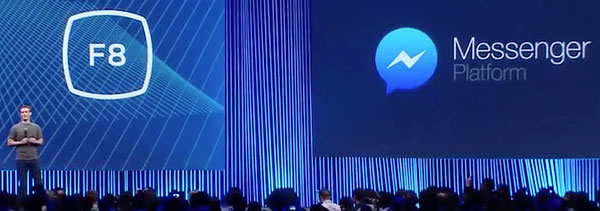Facebook CEO Mark Zuckerberg this week told an audience at the F8 conference for Facebook developers that the company’s future lies in its family of apps and in giving the network’s members the ability to share what they want, where they want.
“We’re building this family so we can offer unique, world-class experiences for all of the ways that people want to share,” Zuckerberg told some 2,000 developers attending the forum in San Francisco.
That shift from a single service to a family of applications is a significant one, he added. “Moving from just being a single service to a family of world-class apps for helping people share in different ways is the biggest shift that we’ve made in our strategy of helping to connect people in many years.”
New Platform
A key part of Facebook’s future strategy will be its new Messenger Platform.
“As Messenger has grown, we think this service has the potential to help people express themselves in new ways, to connect hundreds of millions of new people, and to become a really important communication tool for the world,” Zuckerberg said.
In the past, only Facebook could add new features to Messenger. That’s changing with Messenger Platform, which allows developers to create apps that hook into Messenger, he explained.
In addition, the platform can be used by businesses to communicate directly with their customers through Messenger.
“Helping people communicate more naturally with businesses is going to improve, I think, almost every person’s life,” Zuckerberg said.
With Messenger Platform, it almost seems Facebook is creating another mobile operating system, noted Jan Dawson, chief analyst at Jackdaw Research.
“It’s seems to be building an operating system on top of the existing operating systems,” he told TechNewsWorld.
The platform will improve the workflow between apps by making it easier to share data among them. “Consumers will have a richer experience,” Dawson said.
Competitive Pressure
Expanding Messenger’s capabilities may be a market necessity.
“They had to do something to make Messenger more relevant compared to the other solutions out there that people have adopted and are more flexible,” said Jim McGregor, founder and principal analyst with Tirias Research.
“They’re trying to give Messenger all the features the other messenger apps have and doing more by reaching out to e-commerce. It’s an aggressive goal — especially when you’re trying to pull e-commerce into it — but Facebook is an aggressive company,” he told TechNewsWorld.
“They’re going to need a lot of support for this,” he added, “because they’re not just asking consumers to use this, but they want businesses to use it. That’s a huge challenge.”
Messaging is a popular worldwide phenomenon that Facebook wants to fully exploit.
“It’s trying to make Messenger a more vital, broader tool,” said Greg Sterling, vice president of strategy and insight for the Local Search Association.
Although Zuckerberg touted the “family of apps” approach as the best way to meet all Facebook followers’ needs, it may be a way to cope with future uncertainties in the market.
“They’re hedging, to some degree, for the future,” Sterling told TechNewsWorld.
“These apps have different fan bases, so it’s a diversification strategy,” he explained. “If they absorbed the apps into the Facebook app, it would have destroyed a lot of their value.”
Embedded Video
In addition to announcing Messenger Platform, Facebook unveiled new ways to embed video into outside websites. That’s an especially attractive feature for professional publishers on Facebook.
“If you’re a publisher and you’ve got great video on Facebook, you want the most distribution you can get,” said Gareth Capon, CEO of Grabyo.
“As long as you’re happy seeing that video shared everywhere, you’ll be happy to embed that video on third-party sites where you can get additional consumption,” he told TechNewsWorld. “The best part of embedded content is you still have control of it, so if you want to expire that content or remove it, you can do that through the Facebook platform.”
Facebook also released a software development kit for its Parse platform for the Internet of Things.
With that step, Facebook is showing it’s ready to compete with other big players, like Apple, Samsung and Google, who already are preparing for an explosion of IoT devices in the coming years.






















































